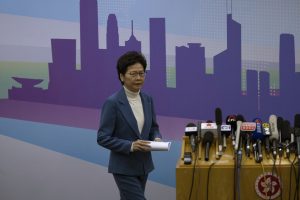Hong Kong Chief Executive Carrie Lam was in Beijing for meetings with top Chinese leaders on Monday. Both President Xi Jinping and Premier Li Keqiang voiced their firm support for Lam and her handling of the protests that have gripped the city since this summer, while also underscoring the severity of the situation.
Xi, for instance, called 2019 “the most grim and complex year for Hong Kong since it returned to the motherland” in 1997.
But he also praised Lam for her “courage and sense of mission… during this special period for Hong Kong,” according to Xinhua.
“In the face of various difficulties and pressures, you have stuck to the bottom line of the ‘one country, two systems’ principle, governed in accordance with the law, scrupulously fulfilled your duty, and done a great deal of hard work,” Xi told Lam during their meeting.
“We will continue to firmly support you in leading the SAR [special administrative region] government to govern in accordance with the law, firmly support the Hong Kong police in strictly enforcing the law, firmly support all people who love China and Hong Kong, and hope Hong Kong people from all walks of life will unite and work together to bring Hong Kong’s development back on track,” the Chinese president added.
In response, Lam thanked Xi for his “care and guidance” since the protests began in June.
The very public show of support – which got top billing on the website of China’s state-run news agency – will tamp down speculation that Beijing is looking to replace Lam as chief executive. An earlier Financial Times report cited insiders as saying that Beijing was exploring a plan to remove Lam as early as March 2020. That seems unlikely now that top Chinese leaders have doubled-down on their support of the embattled Hong Kong chief executive.
Xi particularly emphasized that his stance, and by extension the Chinese Communist Party Central Committee’s stance, has not changed since November 14, when he spoke about Hong Kong at the BRICS summit in Brazil. In the intervening month, pro-Beijing parties suffered a huge loss in district council elections, and Hong Kong witnessed its biggest protest march in months. Despite those developments, Beijing and Lam are still determined to stick to their current track: refusing any concessions or compromise until the protests end entirely; cracking down on the protests with increasing intensity; and offering only socioeconomic solutions (rather than the political reforms the protesters are demanding).
The protesters’ five demands are the withdrawal of the extradition bill that originally sparked the movement; an independent inquiry into police conduct in responding to the protests; overturning the description of the protests as “riots”; the release of all arrested protesters (over 6,000, as of this writing); and the institution of universal suffrage for future Legislative Council and chief executive elections. Of those, only the first demand has been met. The second – an independent investigation into the Hong Kong Police’s response during the protests – is generally viewed as the most politically feasible, should Lam (and Beijing) want to offer another olive branch to the protesters.
But as the Associated Press noted, on Monday Lam once again rejected calls for an independent investigation into widespread allegations of police brutality. She has repeatedly insisted than an internal review already underway is sufficient, though critics say it lacks both the neutrality and the authority to conduct a proper investigation.
Despite the steadfast tone taken by both Lam and Chinese officials, her meeting with Li Keqiang included an acknowledgment that she still faces an uphill task in quelling public discontent – and Beijing is watching closely. “Hong Kong has yet to come out from the difficulties. The city’s government must continue to make efforts in stopping violence and ending chaos in accordance with the law, and restore order,” the Chinese premier warned.
“…We can say that the city is facing unprecedented, serious and complicated situations.”

































